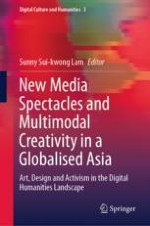2020 | OriginalPaper | Buchkapitel
12. What Are You Looking for? Understanding the Uses and Gratifications of Blued in Mainland China
verfasst von : Yunbo Chen, Runze Ding
Erschienen in: New Media Spectacles and Multimodal Creativity in a Globalised Asia
Verlag: Springer Singapore
Aktivieren Sie unsere intelligente Suche, um passende Fachinhalte oder Patente zu finden.
Wählen Sie Textabschnitte aus um mit Künstlicher Intelligenz passenden Patente zu finden. powered by
Markieren Sie Textabschnitte, um KI-gestützt weitere passende Inhalte zu finden. powered by
